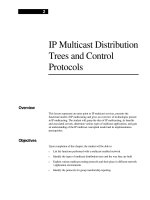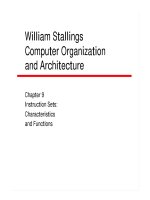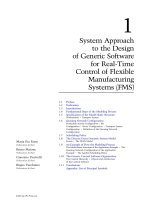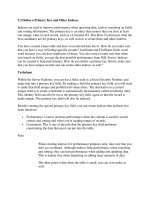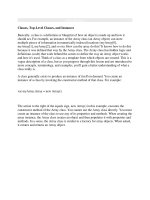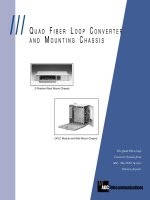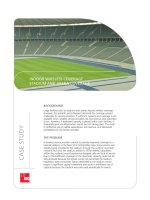Tài liệu STUDYRural Wireless CoverageCoastline Highway and Interior Canyons doc
Bạn đang xem bản rút gọn của tài liệu. Xem và tải ngay bản đầy đủ của tài liệu tại đây (625.66 KB, 2 trang )
CASE STUDY
Rural Wireless Coverage
Coastline Highway and Interior Canyons
Background
Long stretches of open highway would seem like pretty simple areas
in which to provide wireless coverage. However, when the highway is
located along a scenic coastline within a rural canyon, providing wireless
service becomes more challenging. In addition to providing adequate
capacity, the location of new cell sites is restricted in consideration for
the area's natural scenery.
The Problem
Two service providers were challenged with providing wireless service in
the rural canyons along the California coastline. One provider utilized
analog modulation (AMPS) and digital modulation (CDMA) to provide
800 MHz mobile phone service, and the other provider utilized analog
modulation (AMPS) and digital modulation (TDMA) for its 800 MHz
service. Subscribers of both services experienced poor coverage along
the highway and intermittent signal loss while commuting through the
canyons. In addition, nearby business and residential subscribers also
experienced poor service because the highway traffic utilized most of the
capacity from their areas. Placement of additional cell sites was severely
restricted due to visual concerns and zoning regulations.
CASE STUDY
The ADC Solution
ADC worked with both providers to craft a long-range coverage solution that accommodated the
AMPS, CDMA, and TDMA technologies, was visually consistent, and improved service without requiring
many new cell sites. Two base transceiver station (BTS) sites were added along the Pacific Coast Highway
and one site was installed at each end of the canyons that were to be covered. ADC host units were
centralized at the BTS site, creating a base station hotel, to reduce the amount of cabinets required.
Each host unit digitized the RF signals and transported them over fiber optic cable to a remote unit,
which reconverted the signals back into RF to provide coverage into the canyon and highway areas.
Because the remote units are small cabinets that were unobtrusively mounted on existing poles, the
visual impact of the complete solution was minimal.
The digital platform of ADC’s long-range coverage solution was particularly attractive because it easily
met the needs of both service providers. Digital optical RF transport can accommodate both the
CDMA and TDMA technologies that were being used by the two different service providers. Identical
equipment was used for each provider's network, yet the systems were easily configured individually to
meet each provider's requirements. One provider required dedicated TDMA channels for each site, while
the other simulcast CDMA signals. A zone selector was utilized with the TDMA system, allowing RF
channels to be switched between different host units. In that way, a mobile signal could utilize the same
channel throughout the entire call.
Benefits Realized by the Customer
The digital long-range coverage solution was so effective that it enabled coverage along a 12-mile
stretch of winding road from a single host location. Additional capacity and improved coverage was
achieved throughout the highway and canyon areas. As a result of the enhanced highway coverage,
the two service providers' subscribers within the business and residential areas along the highway also
experienced better quality of service and were more likely to retain their service. Furthermore, should
either provider choose to upgrade to a dual-band system in the future, ADC's solution will allow them
to do so within the existing installation by changing out the remote units without requiring additional
zoning approvals to add new cabinets.
Web Site: www.adc.com
From North America, Call Toll Free: 1-800-366-3891 • Outside of North America: +1-952-938-8080
Fax: +1-952-917-3237 • For a listing of ADC’s global sales office locations, please refer to our Web site.
ADC Telecommunications, Inc., P.O. Box 1101, Minneapolis, Minnesota USA 55440-1101
Specifications published here are current as of the date of publication of this document. Because we are continuously
improving our products, ADC reserves the right to change specifications without prior notice. At any time, you may
verify product specifications by contacting our headquarters office in Minneapolis. ADC Telecommunications, Inc.
views its patent portfolio as an important corporate asset and vigorously enforces its patents. Products or features
contained herein may be covered by one or more U.S. or foreign patents. An Equal Opportunity Employer
103211AE 7/06 Revision © 2006 ADC Telecommunications, Inc. All Rights Reserved
